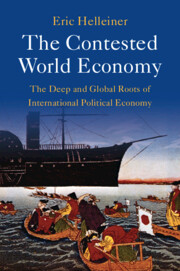Book contents
- The Contested World Economy
- The Contested World Economy
- Copyright page
- Dedication
- Contents
- Preface
- Abbreviations
- 1 Introduction and Overview
- Part I The Three Orthodoxies in a Global Context
- 2 The Rise of European Classical Economic Liberalism
- 3 Economic Liberalism from Non-European Perspectives
- 4 Neomercantilist Reactions in Europe and the United States
- 5 Neomercantilist Reactions Elsewhere
- 6 European Marxist Critiques of Global Capitalism
- 7 The Global Diffusion of Marxist Thought
- Part II Beyond the Three Orthodoxies
- Part III Ending at a Beginning
- Works Cited
- Index
2 - The Rise of European Classical Economic Liberalism
from Part I - The Three Orthodoxies in a Global Context
Published online by Cambridge University Press: 20 April 2023
- The Contested World Economy
- The Contested World Economy
- Copyright page
- Dedication
- Contents
- Preface
- Abbreviations
- 1 Introduction and Overview
- Part I The Three Orthodoxies in a Global Context
- 2 The Rise of European Classical Economic Liberalism
- 3 Economic Liberalism from Non-European Perspectives
- 4 Neomercantilist Reactions in Europe and the United States
- 5 Neomercantilist Reactions Elsewhere
- 6 European Marxist Critiques of Global Capitalism
- 7 The Global Diffusion of Marxist Thought
- Part II Beyond the Three Orthodoxies
- Part III Ending at a Beginning
- Works Cited
- Index
Summary
Classical economic liberalism was the first perspective on political economy to achieve worldwide influence. Its most famous advocate was Adam Smith whose 1776 book The Wealth of Nations became a foundational text for economic liberals that was known around the world by the early twentieth century. In the nineteenth century, some other European political economists consolidated the international dimension of the classical liberal economic perspective by building on Smith’s ideas, including David Ricardo, Richard Cobden, John Stuart Mill and Walter Bagehot. These and other European classical economic liberals were united in the belief that free trade and free markets would foster global prosperity, international peace, and individual freedom. At the same time, they did not always concur about the precise ways that free trade would generate these benefits or about which of them was most important. They also disagreed about the universal relevance of economic liberalism, their willingness to accept exemptions from free trade, their interest in international specialization and economic integration beyond free trade in goods as well as about the place of force, imperialism, civilizational discourse, and intergovernmental cooperation in the economic liberal project. In short, there were many distinct versions of classical economic liberalism.
Keywords
- Type
- Chapter
- Information
- The Contested World EconomyThe Deep and Global Roots of International Political Economy, pp. 19 - 36Publisher: Cambridge University PressPrint publication year: 2023



